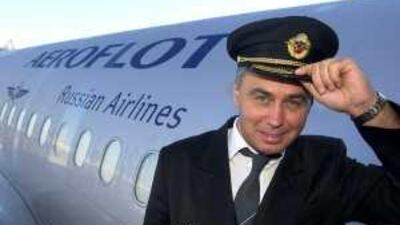It was with considerable consternation that I read the news last week that Aeroflot, the Russian flag-carrier airline, was to rein in its ambitious expansion strategy, starting with the loss of 2,000 jobs and the postponement of a planned fleet renovation. I had been looking forward to plotting the course of the airline's progress from international joke to sleek new people carrier. Now I will have to wait a little longer to see how this tale unfolds, and record the inevitable hiccups and setbacks that such a programme will entail.
The reason for the halt to Aeroflot's transformation is - you've guessed it already, I imagine - the recession. Faced with rising costs for aviation fuel, even in energy rich Russia, and falling demand from Russian travellers, the airline suffered plummeting profits last year, and decided its planned orders of new Airbuses should be put on hold. Before the credit crunch, Aeroflot was planning to triple the number of passengers it carried each year to an ambitious 21 million by 2015. It had joined the Sky Team alliance headed by Air France/KLM, and had even been tipped as a possible rescuer of ailing Alitalia. Now it will, for the time being, just carry on being one of the worst airlines in the world.
My one and only trip on Aeroflot was memorable for many reasons. The clapped-out Tupolev that took me from Moscow to St Petersburg in the late '90s was many years past its best. The flight, on a freezing day in December, had been massively overbooked, leading to a serious fist-fight on board as passengers tried to grab the (unallocated) seats. Many ended up standing in the aisles for the duration, a phenomenon I had never before witnessed but which is now being seriously considered by airlines in Europe and Japan.
Once we were airborne, the in-flight service was abysmal. The grumpy cabin crew seemed to take great delight in telling us passengers there would be no refreshment on the two-hour flight, except for tepid water in plastic cups. (How Aeroflot managed to produce lukewarm water when the outside temperature was minus 25 degrees is still a mystery). But, once I'd sampled Aeroflot cuisine on the return trip, I was relieved to have been spared it outward bound. For somebody like Tyler Brûlé, the Financial Times' high-flying aviation connoisseur, it would have been a vision of Hell.
But what I realised on that trip was that Aeroflot had in fact been a pioneer of the low-cost airline model that has since swept all before it in the aviation industry - in more ways than just making passengers stand during flights. In the egalitarian spirit of Soviet communism, the strategy had been to make air travel across Russia's vast distances available to all, at low cost. My return trip between Moscow and St Petersburg cost something in the region of US$50 (Dh183) - about half the price of the hotel taxi from Moscow to Sheremetyevo airport.
The Soviet version of no-frills travel worked well for a long time. In the 1970s, before low-cost travel took off in the west, Aeroflot was the world's largest airline in terms of passenger miles travelled. Freed from normal financial constraints by dint of its ownership by the Soviet state, it could get bums on seats for a minimal number of roubles and provide an essential social service for the not-too-demanding Russian travelling public.
After the end of the Soviet era in 1991, Aeroflot was part-privatised, with 49 per cent of its newly created equity either given to employees or sold to state investment authorities. The majority 51 per cent was retained by the Russian government, which continued to subsidise but simultaneously planned full privatisation for some time in the future. That process too has been halted by the recession, I imagine.
(Incidentally, the airline's Soviet heritage is visible in more ways than just the shoddy service. Its coat of arms, the winged hammer and sickle, has been retained, and is one of the few places where you can still find the old Soviet symbol in the "new" Russia.) The point is this: just as the west was discovering the "joys" of low-cost airtravel, the Russians were quite neatly grafting a long-haul national carrier model on to an existing and successful no-frills domestic service. By chance, they had hit upon the business model that almost every carrier in the world, from British Airways to Emirates Airline, has since tried to follow, with varying degrees of success.
Perhaps the most successful no-frills airline to emerge from the transformation of the industry, Ryanair of Ireland, does not fly to Moscow, but it has more in common with its Russian counterpart than you would imagine on first glance. In fact, it is known among its many critics as "Eireoflot". The Russians got there first. fkane@thenational.com

